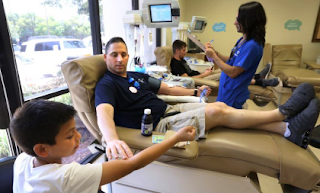After the violent shooting at Pulse nightclub in Orlando on last 12 June, OneBlood, a local blood bank, put out an urgent call for blood donations.
By 9:56 A.M., OneBlood’s website crashed, and by the end of the day more than 5,300 people had donated blood across the state of Florida. A minority among the outpouring of donors, however, was gay and bisexual men. And nobody is willing to risk having those possibly HIV-infected blood flowing inside them.
The Food and Drugs Administration (FDA) has a policy barring a potential gay blood donor for one year after his last sexual contact with another man. The policy, which debuted in 1985 in response to the AIDS epidemic, previously instituted a lifetime ban for any man who had sexual contact with another man. This policy was updated in December 2015.
The reason why gay blood are considered a possible public health hazard is that a history of male-to-male sexual contact was associated with a 62-fold increased risk for being HIV positive, whereas the increase in risk for a history of multiple sexual partners of the opposite sex in the last year was 2.3-fold.
The Center for Disease Control (CDC) said that, "gay, bisexual, and other men who have sex with men (MsM) represent approximately 2 percent of the United States population, yet are the population most severely affected by HIV."
In 2010, for instance, young gay and bisexual men (aged 13-24 years) accounted for 72 percent of new HIV infections among all person aged 13 - 24 yrs, and 30 percent of new infections among all gay & bisexual men. At the end of 2011, an estimated 500,022 (57 percent) persons living with an HIV diagnosis in the United States were gay and bisexual men, or gay and bisexual men who also inject drugs.
In 2013, in the United States, gay and bisexual men accounted for 81 percent (30,689) of the 37,887 estimated HIV diagnoses among all males aged 13 yrs+, and 65 percent of the 47,352 estimated diagnoses among all persons receiving an HIV diagnosis that year.
For those who are screaming "discrimination" and "equal treatment" for gays, why don't you use the blood from a genuine gay whenever you are in a hospital for operation and see what happens.
By 9:56 A.M., OneBlood’s website crashed, and by the end of the day more than 5,300 people had donated blood across the state of Florida. A minority among the outpouring of donors, however, was gay and bisexual men. And nobody is willing to risk having those possibly HIV-infected blood flowing inside them.
The Food and Drugs Administration (FDA) has a policy barring a potential gay blood donor for one year after his last sexual contact with another man. The policy, which debuted in 1985 in response to the AIDS epidemic, previously instituted a lifetime ban for any man who had sexual contact with another man. This policy was updated in December 2015.
The reason why gay blood are considered a possible public health hazard is that a history of male-to-male sexual contact was associated with a 62-fold increased risk for being HIV positive, whereas the increase in risk for a history of multiple sexual partners of the opposite sex in the last year was 2.3-fold.
The Center for Disease Control (CDC) said that, "gay, bisexual, and other men who have sex with men (MsM) represent approximately 2 percent of the United States population, yet are the population most severely affected by HIV."
In 2010, for instance, young gay and bisexual men (aged 13-24 years) accounted for 72 percent of new HIV infections among all person aged 13 - 24 yrs, and 30 percent of new infections among all gay & bisexual men. At the end of 2011, an estimated 500,022 (57 percent) persons living with an HIV diagnosis in the United States were gay and bisexual men, or gay and bisexual men who also inject drugs.
In 2013, in the United States, gay and bisexual men accounted for 81 percent (30,689) of the 37,887 estimated HIV diagnoses among all males aged 13 yrs+, and 65 percent of the 47,352 estimated diagnoses among all persons receiving an HIV diagnosis that year.
For those who are screaming "discrimination" and "equal treatment" for gays, why don't you use the blood from a genuine gay whenever you are in a hospital for operation and see what happens.
